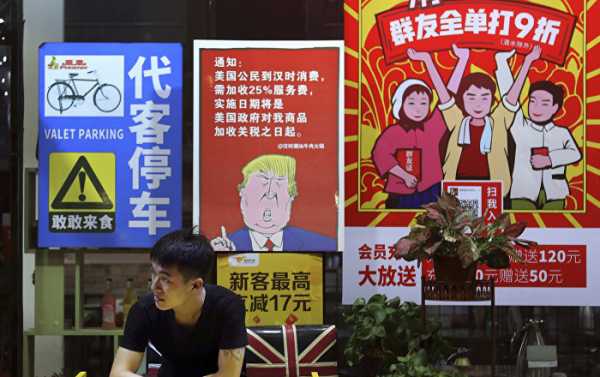
Last week, following a meeting with Chinese President Xi Jinping, US President Donald Trump announced a truce in the US-China trade spat and the resumption of talks, saying the US would hold off on new tariffs against another $300 billion worth of Chinese imports, for the time being.
China will go back on its commitment to resume the purchase of agricultural products from hurting US farmers if Washington “flip-flops” on trade talks, Taoran Notes, a popular social media account affiliated with major Chinese newspaper Economic Daily has warned, South China Morning Post reports.
“If the US flip-flops again in the negotiations, the promises to buy American agricultural products will also be overturned,” the WeChat-based media platform wrote.
Accusing the Trump administration of treating China unfairly and referring to White House economic adviser Larry Kudlow’s recent comments that the US would not be removing its existing tariffs, Taoran Notes wrote that Beijing would have to evaluate domestic demand, as well as the ‘opinions’ of Chinese firms, before resuming the purchase of US agricultural goods.
Last week, following his meeting with the Chinese president at the G20 in Osaka, Japan, President Trump said China had committed to resuming the purchase of “tremendous” amounts of agricultural goods from US farmers. American farming communities, often located in key Trump-supporting states, have been hit hard by China’s retaliatory tariffs billions of dollars’ worth’ of US soybeans and other crops.
US trade negotiators will head to Beijing next week to continue talks agreed to by Presidents Trump and Xi in Osaka.
A source told SCMP that China may hold off on resuming the purchase of American soybeans until Trump moves ahead with President Trump’s promise to ease restrictions against Chinese electronics giant Huawei. This week, Trump said he would allow US companies to sell equipment to Huawei if this does not compromise national security. The source warned that talks would “break down immediately” if negotiators couldn’t resolve the issue.
Another source close to the Chinese government said that despite the tensions, China remains ‘cautiously optimistic’ about the prospects of a deal being reached. “There will be a deal at a time before Trump’s presidential election run, though the talks process will be painful,” the source said.
On Thursday, Chinese Foreign Ministry spokesperson Geng Shuang said China would not devalue its currency as a means of resolving its trade war with the US. The promise followed complaints by President Trump about China and Europe allegedly “playing [a] big currency manipulation game” and “pumping money” into their economies to outcompete the US.
A day earlier, the White House reported that it had provided a small concession by partially opening up reviews of exports requests to Huawei, but added that it would do so “under the highest national security scrutiny,” because the company remains blacklisted.
The China-US trade war kicked off in mid-2018, when Washington slapped tariffs on $50 billion in Chinese imports to try to deal with the US’s staggering $400 billion+ trade deficit. China responded with tariffs against US goods, and the conflict has since escalated in a series of back and forth tariff hikes. In May, the US imposed 25 percent tariffs on another $200 billion worth of Chinese products, with China pledging to hike tariffs on $60 billion in US imports. Ahead of last week’s G20 meeting, President Trump threatened to slap tariffs on the estimated $300 billion in Chinese goods not yet affected by the tariff war.
Along with the import duties, the US has resorted to blacklisting Chinese tech giant Huawei, accusing the company of installing “backdoor” access in its devices to help Chinese intelligence services spy on users worldwide. China has rejected the claims.
Last week, in a bid to reduce Chinese dependence on trade with the US, President Xi unveiled a major new plan to reduce tariffs and remove other trade barriers in a bid to increase imports, trade and openness of China’s economy to global trade. The plan includes the creation of six new free trade zones and the liberalization of relations between Chinese enterprises and foreign firms in the fields of agriculture, services, mining and manufacturing.
Sourse: sputniknews.com






